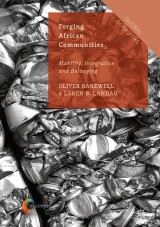Details

Forging African Communities
Mobility, Integration and BelongingGlobal Diversities
|
96,29 € |
|
| Verlag: | Palgrave Macmillan |
| Format: | |
| Veröffentl.: | 22.11.2017 |
| ISBN/EAN: | 9781137581945 |
| Sprache: | englisch |
Dieses eBook enthält ein Wasserzeichen.
Beschreibungen
This book draws renewed attention to migration into and within Africa, and to the socio-political consequences of these movements. In doing so, it complements vibrant scholarly and political discussions of migrant integration globally with innovative, interdisciplinary perspectives focused on migration within Africa. It sheds new light on how human mobility redefines the meaning of home, community, citizenship and belonging. The authors ask how people’s movements within the continent are forging novel forms of membership while catalysing social change within the communities and countries to which they move and which they have left behind. Original case studies from across Africa question the concepts, actors, and social trajectories dominant in the contemporary literature. Moreover, it speaks to and challenges sociological debates over the nature of migrant integration, debates largely shaped by research in the world’s wealthy regions. The text, in part or as a whole, will appeal to students and scholars of migration, development, urban and rural transformation, African studies and displacement.
Chapter 1: Introduction: Forging a Study of Mobility, Integration and Belonging in Africa; Loren B Landau and Oliver Bakewell.- Part 1.- Chapter 2: “We are like a bat. We are neither birds nor animals”: Where the formal and informal collide as Burundian refugees in Tanzania struggle for belonging ; Lucy Hovil.- Chapter 3: Integration from the beach: insights from the experiences of artisanal fishing immigrants in Pointe-Noire City, Congo-Brazzaville; Gabriel Tati.- Chapter 4: The Moroccan moment and communities of itinerants: mobility and belonging in the transnational trajectories of sub-Saharan migrants; Johara Berriane.- Chapter 5: Negotiating a space of belonging: a case study from the Zambia-Angolan borderlands; Oliver Bakewell.- Part 2.- Chapter 6: Tactical Creolisation and the Production of Belonging in Migrant Pentecostal Churches in Post-Apartheid South Africa; Peter Kankonde Bukasa.- Chapter 7: Catechism, Commerce and Categories: Nigerian Male Migrant Traders in Harare; Pedzisayi Leslie Mangezvo.- Chapter 8: Social capital, spatial conquests and migrants’ social mixity: Nigerians and Chinese in Lubumbashi, DRC; Germain Ngoie Tshibambe.- Chapter 9: ‘We are all Ugandans’: In search of belonging in Kampala’s urban space; Naluwembe Binaisa.- Part 3.- Chapter 10: “The Friends of our Friends are our Friends”: Determinants of Hosts’ Contact with International Migrants in Post-Apartheid South Africa; Steven Gordon.- Chapter 11: Pentecostalism and a global community of sentiment: the cases of Nigerian and Congolese pastors in Diaspora; Rafael Cazarin.- Chapter 12: Shallow Solidarities: Space and Socialities of Accommodation and Exclusion in Nairobi and Johannesburg; Loren B Landau and Iriann Freemantle.- <div><br></div><div><br></div><div><br></div>
<div><div><div>Oliver Bakewell is Senior Lecturer at the Global Development Institute, University of Manchester, UK and former Director of the International Migration Institute at the University of Oxford. </div><div><br></div><div>Loren Landau is South African Research Chair in Mobility and the Politics of Diversity at the African Centre for Migration & Society, University of the Witwatersrand, South Africa.</div><div><br></div><div><br></div></div></div><div><br></div>
This book draws renewed attention to migration into and within Africa, and to the socio-political consequences of these movements. In doing so, it complements vibrant scholarly and political discussions of migrant integration globally with innovative, interdisciplinary perspectives focused on migration within Africa. It sheds new light on how human mobility redefines the meaning of home, community, citizenship and belonging. The authors ask how people’s movements within the continent are forging novel forms of membership while catalysing social change within the communities and countries to which they move and which they have left behind. Original case studies from across Africa question the concepts, actors, and social trajectories dominant in the contemporary literature. Moreover, it speaks to and challenges sociological debates over the nature of migrant integration, debates largely shaped by research in the world’s wealthy regions. The text, in part or as a whole, will appeal to students and scholars of migration, development, urban and rural transformation, African studies and displacement.
Fills a significant lacuna in research by addressing intra-Africa migration Presents work by a diverse set of scholars working in a broad range of African settings Speaks to and challenges sociological debates over the nature of migrant integration
“This timely book represents a major contribution to our understanding of social, economic, political, and cultural processes related to human mobility in general and contemporary African migrations in particular. Its welcomed focus on agency and processes helps to bring new theoretical insights to the analysis of social change in migration contexts. The vivid case studies presented here challenge in a novel way old concepts and theories about migration that were predominantly based on empirical data collected among migrants in Western destinations. No doubt this book will be beneficial to the study of contemporary mobility and migration in the context of wealth countries across the globe.” (Abdoulaye Kane, University of Florida, USA, and Co-editor of African Migration: Patterns and Perspectives)<p></p><div><p>“‘Forging African Communities’ is an ambitious book that successfully achieves a dual mission. First and foremost, the diverse analyses of attachments, adaptations, and tactics come together as an illuminating account of contemporary migration within Africa—a staggeringly understudied phenomenon. More subtly, the book challenges standard concepts that reflect entrenched research and policy agendas in the Global North. The primary one is ‘integration’ which, if we are to keep using it, merits a refreshing overhaul in light of the analyses presented in this book.” (Jørgen Carling, Peace Research Institute Oslo, Norway.)</p></div>

















